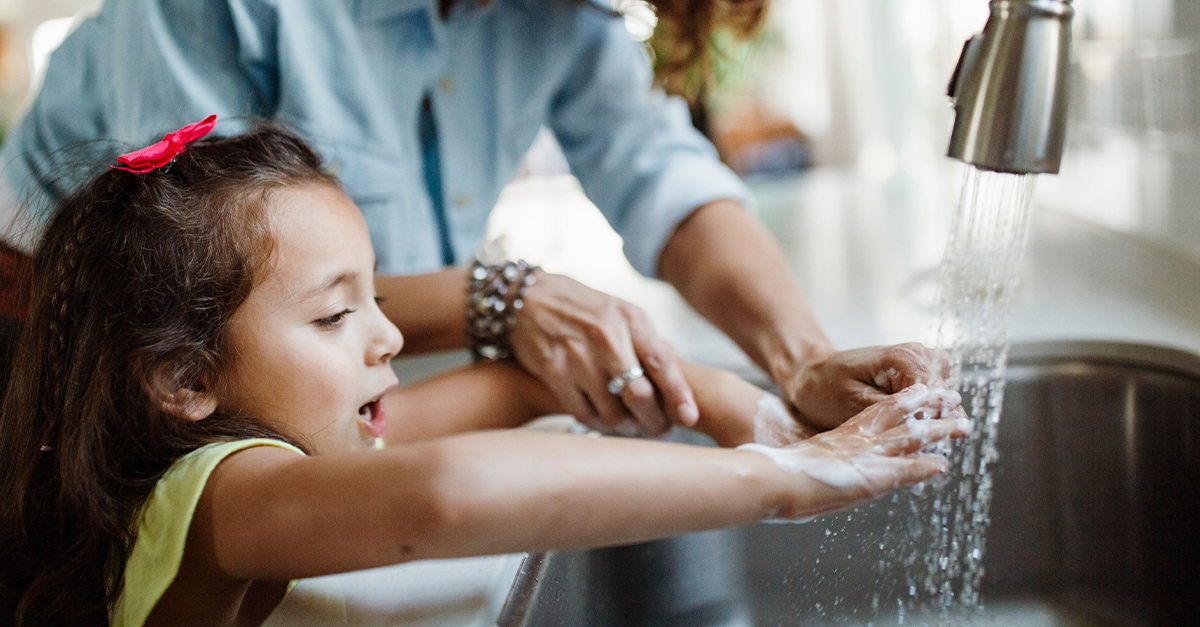7 Healthy Habits for Kids to Learn Early in Life

Developing healthy habits doesn’t come naturally to children. If you let them have their way, they’d probably choose to eat only their favorite snacks, stay up too late, and maybe even play video games all day. As a parent, it’s your responsibility to help your child adopt habits that will set them up for a healthy life. But how do you know which habits to prioritize? Below, we’ve highlighted our top seven healthy habits for kids to learn from an early age.
7 Essential Healthy Habits for Kids
By modeling and encouraging your children to establish the following habits while they’re young, you’ll build a strong foundation for them to make healthy lifestyle choices as an adult.
1) Spending Time Outdoors
Most children today aren’t spending enough time outside. In fact, it has been estimated that kids in the U.S. only spend an average of four to seven minutes per day playing outdoors and four to six hours in front of a screen. And yet, research shows that children who spend time outdoors are often happier and healthier than those who don’t. Being in nature offers numerous benefits, such as:
- Reducing stress and fatigue
- Boosting mood
- Increasing vitamin D
- Fostering creativity
- Improving focus
Spending time outdoors also encourages children to get moving, which brings us to our next healthy habit.
2) Being Active
Like all people, kids benefit greatly from physical activity. According to the CDC, exercising regularly helps children build strong bones and muscles, improves cardiorespiratory health, improves mental health, and reduces the risk of health conditions such as diabetes and cancer.
If you’re concerned that your child isn’t exercising enough, provide them with more opportunities to be active. Get outside as a family and get your bodies moving multiple days per week. You can take walks together, go on bike rides, learn a new game like pickleball, or simply play tag in your backyard. Lead by example—your child will be more inclined to get off the couch and get moving if you do, too.

3) Making Good Food Choices
In addition to physical activity, good eating habits are incredibly important for children’s health. A lot of food marketed towards kids today is full of preservatives, dyes, and added sugars that can lead to issues like childhood obesity. So, be sure to teach your child the benefits of fueling their body with nutrient-rich foods rather than junk.
While occasional treats are okay, it’s best to limit the amount of processed foods you offer your children. Instead, keep your kitchen stocked with healthy snack options like fruits, veggies, Greek yogurt, and trail mix. We also suggest that you encourage your child to primarily drink water rather than soda or juice.
Additionally, having consistently scheduled, well-balanced meals as a family will help ensure that your child is eating nutritious foods. Remember, children are a product of their environment. If you fill your home with healthy foods and raise your kids to eat fairly clean, then that’s what they’ll be accustomed to as an adult.
4) Prioritizing Personal Hygiene
Little ones come into contact with lots of dirt and germs each day. In order to prevent sickness and keep them clean, it’s important that they know how to maintain good personal hygiene. Here are some habits that you should teach your children very early on.
- Bathing regularly
- Brushing teeth twice per day
- Washing hands properly
- Wearing clean clothing
- Covering mouth when sneezing or coughing
Be sure to explain to your children what germs are and how practicing good hygiene habits can help keep them healthy.

5) Getting Enough Sleep
While it’s important for everyone to get good sleep, it’s especially crucial for growing children. Sleep has a significant impact on children’s overall health and development, and having too little of it can cause problems related to behavior, mental health, and cognition.
To avoid these issues, be sure to research what the recommended amount of sleep is for your child’s age and make sure they’re getting that much each day. Although it can be challenging at times with busy schedules, try to stick to a consistent sleep routine as much as possible.
If your little one likes to protest at bedtime, explain to them that sleep helps them feel good and energized. When they feel tired, that’s their body’s way of telling them that they need to rest.
6) Limiting Screen Time
As we mentioned above, American children spend an average of four to six hours in front of a screen every day. While these tools have their time and place, spending too much time staring at a television, computer, or handheld device isn’t healthy.
Teach your child healthy tech boundaries by setting a time limit, such as two hours per day, and sticking with it. You can be a good role model by limiting your own screen time. Consider even designating screen-free areas in your home or certain times when everyone must unplug for the night. Instead of playing on apps or watching TV, enjoy some quality time together as a family.

7) Reading Daily
Another healthy habit for kids to learn at an early age is reading. In fact, it’s never too early to start reading to your child. Frequent reading encourages language development, literacy skills, and introduces children to various topics. To reap the most benefits, experts recommend reading to your child or having them read independently for at least 20 minutes each day.
Starting these habits at a young age will serve your children well both now and in the future. Sure, they might complain here and there about having to eat broccoli or going to bed by 8:00 p.m., but they’ll be grateful for it in the long run (even if they never admit it).